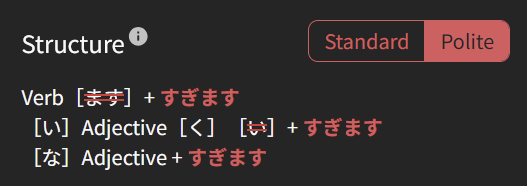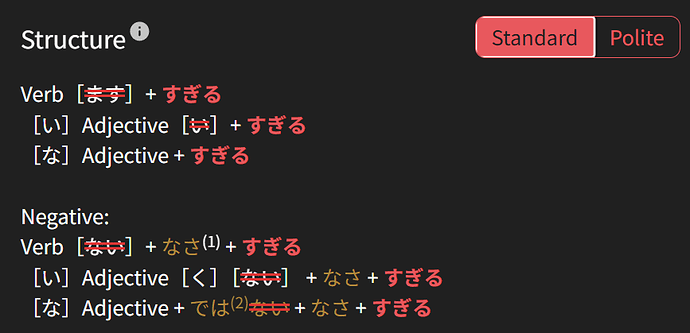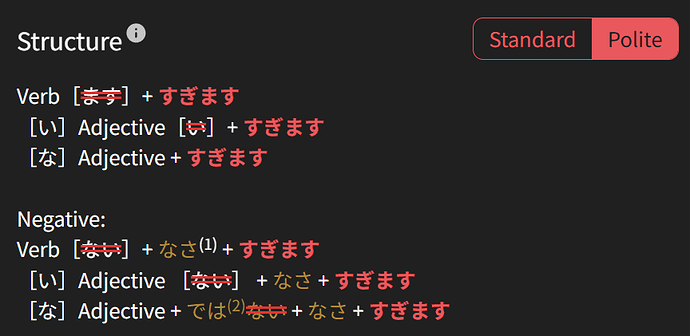Well I’m glad I was able to bring some amusement into this dreary world lol. Thanks for the answer!
In this example:
アイスクリームを食たべすぎたからお腹なかが痛いたい
I noticed that 食たべすぎる is in the past tense. I thought that usually the last word in the sentence has the tense (in this example いたい) while the rest of the sentence would remain in non-past tense. Was I wrong in thinking this?
You’re kinda right, but in this case it’s the last word in the clause that carries the tense. Think of it as “Phrase A, Phrase B”…
アイスクリームを食べすぎたから、お腹が痛い。
アイスクリームを 食べすぎた から、-- Because I ate too much ice cream, (past tense)
お腹が 痛い。-- My stomach hurts. (present tense)
Thanks for the explanation.
Is this same さ the one we use when nominalizing adjectives? 高い (long) → 高さ (length)
No, it’s not. I think you’re looking in too close to it, its a bit like thinking there’s a pattern between ‘though’ and ‘enough’ because they both end in -ough.
気にしないで!
Hi I am having difficulties with the double negative.
In Dutch, English and French they sound unnatural to me. but maybe it is more common in Japanese. I don’t know.
- 彼はトイレに行かなさすぎない。
He doesn’t not go to the toilet enough. (A double negative that becomes positive)
So first a literal translation from the Japanese into English. But than than that is followed by explanation (a double negative that becomes positive).
thus the English Translation would be
He does go to the toilet enough (since it becomes positive following the explanation)
Now more logically I would think that it means
He doesn’t go to the bathroom too often
or
He doesn’t go to the bathroom enough.
Thus there is no double negative that becomes positive in the actual translation.
If it means that . Than I am confused in why you would use a double negative in this example.
Maybe a doctor said he probably doesn’t go to the toilet enough. In which the reply can be the opposite. He does go enough and the double negative but that really sounds unnatural to me
It’s like saying I don’t want no toppings on my pizza.
Meaning you want toppings on your pizza.
Maybe in Japanese double negatives are more common but In English , Dutch and French they all sound really unnatural to me.
And I am not being not serious about this question.
edit:2022-12-18T23:00:00Z
So I looked it up in the three languages and a double negative in all these languages is ungrammatical. Much worse than unnatural sounding as I said earlier.
It’s grammatical in Japanese the sentences with て+は+いけない ならない。 come to mind.
Anyway my point probably is that the translation to a double negative in English, should be corrected (maybe in a second step) to what the correct English translation should be.
It confuses me a lot about the actual meaning if there is no correct translation.
I don’t mind the literal translation, it should also have a correct one.
So please could you give me a correct translation of the sentence.
*** 彼はトイレに行かなさすぎない。**
He doesn’t not go to the toilet enough. (A double negative that becomes positive)
is it
He doesn’t go to the toilet enough?
Thanks
Okay, I’m just making sure I understand the negative-usage of すぎる:
- 寝た。- I slept.
- 寝なかった。- I did not sleep.
- 寝すぎた。- I slept too much.
I’m not sure if I’m reading my own examples correctly:
-
寝なさすぎた。- I did not sleep too much.
-
寝なさすぎなかった。- I did not not sleep too much. (double negative, right?)
-
寝すぎない下さい。 - Please don’t sleep too much.
I also wasn’t sure if some of these examples could be written differently, as in:
- 寝すぎなかった。(I did not sleep too much.)
- 寝なさすぎ下さい。 (Please don’t sleep too much.)
Would these above examples work, or did I miss anything?
I’m also not sure, because the English translation is ambiguous. But the Japanese means “did too much not-sleeping” = “I slept too little”.
Whereas
means “I didn’t do too much sleeping” = “I did not oversleep”.
There also are some issues with how you’re using ください.
Ahh gotcha, that makes a lot more sense. Thanks for the reply.
I kinda threw those 下さい examples in at the last moment since the one review example stumped me for a bit (お菓子を食べすぎないでください。). I didn’t realize the specific example also contains a footnote that clarified some of my confusions.
I thoroughly enjoy your explanations in this thread (and in general), I went here to ask questions about this なさ construct and they’re already all answered!
Beyond そう and すぎる, are there other grammatical constructions that change the negative ない to なさ? I keep forgetting this little irregularity and I’m trying to see if I can come up with some underlying logic for it, even though there doesn’t appear to be any…
That 冗談は面白くなさすぎた example sentence is tricky, but it’s very useful to drill this point.
Honestly I almost wish that the negative form (and that of そう) was given a dedicated entry just so that you could review this なさ irregularity on its own.
Wow Im just realizising today this has a negative form. I think it deserves its own page to be honest, it can get pretty complex.
大きくないすぎる。- Not big enough?
大きすぎない。- Not too big?
Hello, I’m a bit confused about this example sentence:
今日の授業は長すぎました。
(Today’s class was too long.)
Since it asks for the polite version + い-adjective, I’d expect the answer to be “ながくすぎました” (which is obviously wrong since I can’t change my typed kana なが into 長).
But according to the description for polite + い-adjective, the last い gets replaced with a く:

But that’s not what’s happening in the example.
Unfortunately, this is the only example sentence with the combination of polite + い-adjective for comparisons.
Can someone help me to understand what I’m missing here? 
It’s just an error in the Structure block.
Standard form looks good:
[い]Adjective[い]+ すぎる
[い]Adjective[く][ない] + なさ + すぎる
And Polite version should follow the same pattern:
[い]Adjective[い]+ すぎます
[い]Adjective[く][ない] + なさ + すぎます
Hey @KUROKAT !
This was a typo on our end, and we have just fixed it! Thank you for letting us know about this!
I feel like this will forever be a ghost for me. Every time I get to the question, I rely on the “Negative-past” which throws me off. I always try to use a form of なかった.
I only learned this grammar point today, but glad to see there’s so many posts in this discussion. I read the lesson and was certain this will be by far the hardest grammar point for me to learn. A lot of sentences with previous grammar felt natural, but here it just doesn’t make sense in my brain.
I guess with enough exposure things will work out, but this looks scary.
彼はトイレに行かなさすぎない。
He doesn’t not go to the toilet enough. (A double negative that becomes positive)
彼は = He
トイレに = To the toilet
行かな = to not go
さすぎない = to not be enough
So this sentence would mean “He does go to the bathroom enough”? Since the assumption that the double negative made it positive.
Sorry if this question is dumb, but English is not my first language and seeing a double negative in Japanese kind of threw me off.
I’m also not a native speaker of English and that is indeed a pretty weird example as far as I can tell. I can’t quite imagine when something like that would be said. But I do think that your interpretation is correct.




